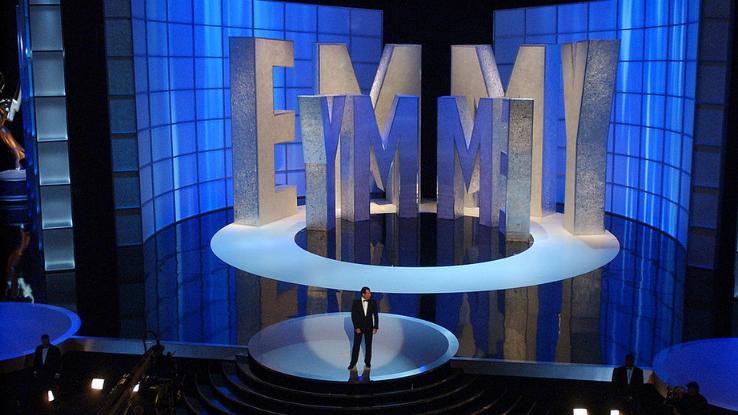
The 73rd Primetime Emmy Awards kick off tomorrow night. Delta variant cases have prompted the Emmys to support a drastically reduced number of in-person attendees. However, that doesn’t mean that there will be a drastically reduced number of nominees. The Mandalorian is up for 19 nominations while Lovecraft Country and The Queen’s Gambit have been nominated for 12 categories. Cedric the Entertainer is set to host this year – bringing some much-needed levity to a very eventful year. The 73rd Emmy Awards Show will be a night to remember, as has always been the case. Let’s look back at some of the most unforgettable moments in Emmys History.
Want more Emmys content? Check out our other installments of Emmys Watch, like our hot takes on this year’s biggest surprises and snubs.
And the First Emmy Goes to…Shirley Dinsdale | 1949
Before she broke into television, Shirley Dinsdale was a noted ventriloquist and 1940s radio personality based out of San Francisco. As a child, an accident led to Dinsdale being badly burned. During her recovery, Dinsdale’s father gave her a ventriloquist dummy, which the actress dubbed “Judy Splinters.” And it was Judy that helped Dinsdale nab an Emmy.
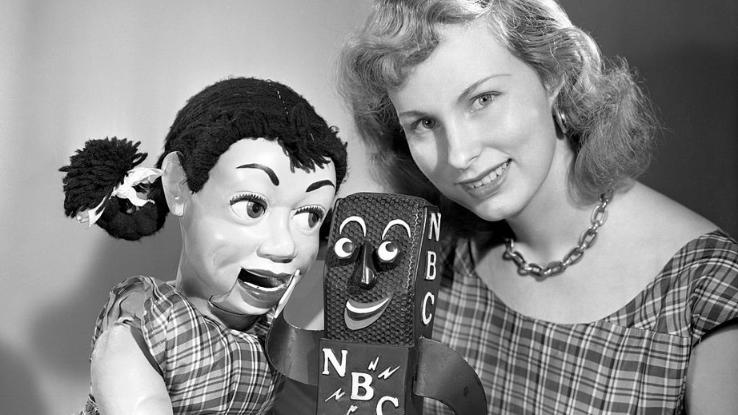
On a pioneering short television show for children, Dinsdale performed with Judy Splinters and won an Emmy for Outstanding Television Personality. Why is this so significant? Well, 1949 marked the very first Emmys show, and Dinsdale’s award was the first award of the night. This makes her the first-ever recipient of an Emmy award.
Jon Hamm Crawls Like a Mad Man | 2015
As they say in showbiz, the eighth time is the charm — or so it was for Mad Men‘s Jon Hamm anyway. He was nominated for his portrayal of Don Draper every year after the show’s premiere, but it wasn’t until that farewell season that Hamm finally came out on top. Possibly because the years of working on Mad Men were weighing on him, Hamm disregarded the steps and crawled on stage to accept the award.
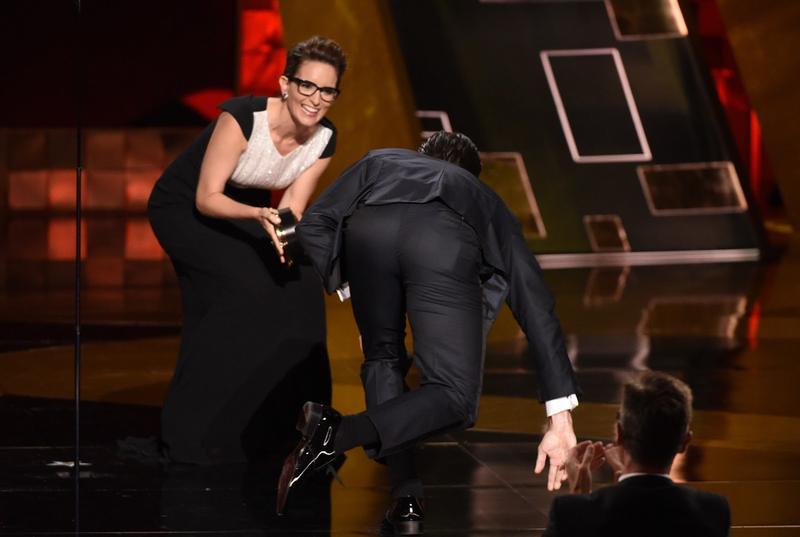
From Outstanding Drama Series to Outstanding Main Title Design, Mad Men nabbed six Emmys in its first year. However, although the program was much-loved by critics and fans alike, none of the actors had ever snagged the golden statuette. Even Hamm was surprised to break the curse. “There’s so many incredible people and incredible work that has been recognized over my own that I can’t hold a grudge at all,” the actor said. “It’s not like they gave it to some guy off the street. And that’s not anything against Billy on the Street, by the way.” The 2015 show did solidify at least one thing: Jon Hamm knows how to make an entrance.
Julia Louis-Dreyfus Wins the Popular Vote With Veep | 2017
Julia Louis-Dreyfus is familiar with the Emmys’ stage thanks to her wins in the Best Supporting Actress in a Comedy and Best Lead Actress in a Comedy for Seinfeld and The New Adventures of Old Christine, respectively. But her starring role in Veep as perennial presidential hopeful Selina Meyer led Louis-Dreyfus to make awards-show history.
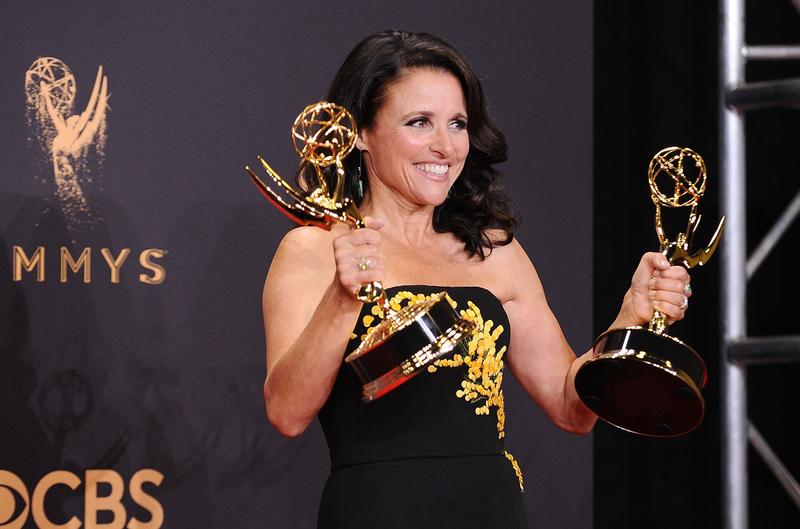
Nominated each year from 2012 to 2017, Louis-Dreyfus nabbed the top prize every year she (and Veep) was eligible. This adds up to the most wins for a single role, beating out comedy legends Mary Tyler Moore, Lucille Ball and Carol Burnett.
In 2018, Veep went on hiatus to allow Louis-Dreyfus to focus on her health after a cancer diagnosis. With eight Emmy wins, she is currently tied with legendary actress Cloris Leachman, and, although she was nominated in 2019, Louis-Dreyfus lost to Phoebe Waller-Bridge and missed her chance to become the most decorated Emmy winner in history. Here’s hoping she returns to our TVs soon.
Merritt Wever Remedies Long Speeches | 2013
Though Merritt Wever has popped up in big-name productions like Signs (2002), Studio 60 on the Sunset Strip, and Law & Order, she became a household name in 2013 when she killed it on Showtime’s Nurse Jackie. In fact, Wever was nominated for Best Supporting Actress in a Comedy for her work on the show in 2013.
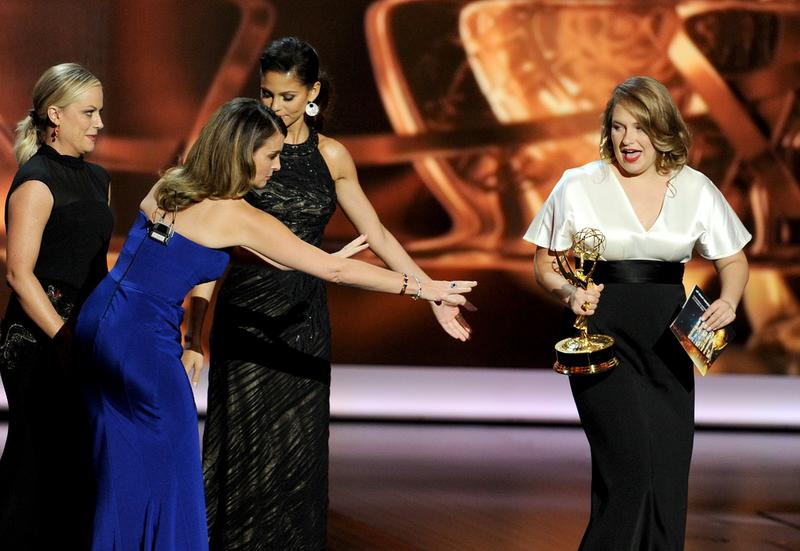
Wever was by no means the frontrunner in her category, which was stacked with previous Emmy winners, including Modern Family‘s Julie Bowen and Glee‘s Jane Lynch. When her name was called, she seemed just as surprised as the audience, and, maybe out of shock, kept her speech to a minimum. Instead of getting played off, Wever faced the camera, statuette in hand, and said, “I gotta go… Bye.” And abruptly left the stage. Her “speech” became such a popular meme that Wever even referred to it during her second Emmy win for Netflix’s Godless.
Lucille Ball Creates a Spectacles Spectacle | 1975
Though Lucille Ball won several Primetime Emmy Awards, her acceptance speeches weren’t her most memorable moments on the Emmys’ stage. In 1975, the Queen of Comedy turned the presentation of Outstanding Comedy Series into a familiar slapstick gag. She announced, “And the winner is…” — and then struggled with the envelope for a moment before admitting that she had forgotten her glasses.
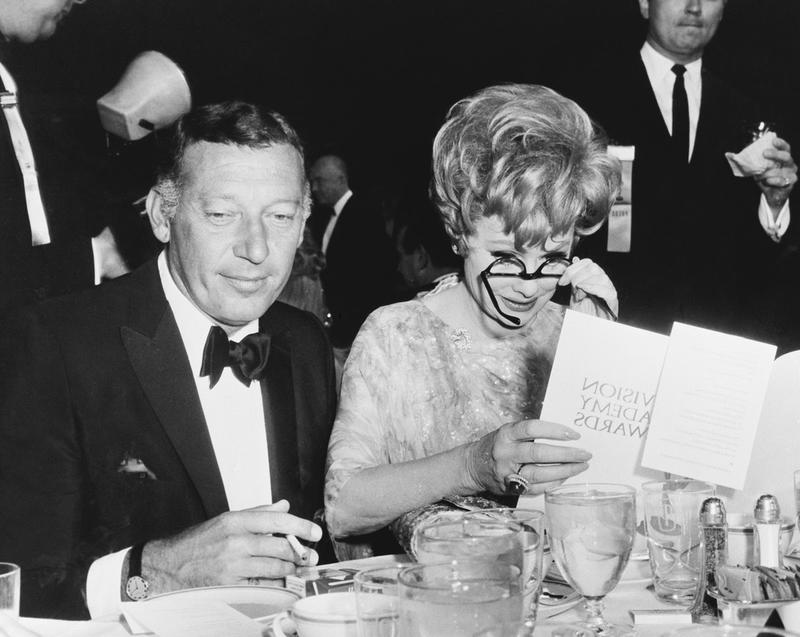
Ball couldn’t see a thing. Squinting, she realized she had mixed up the envelopes and muttered, “I’m really in trouble,” to a symphony of laughter from the audience. (We can just about hear Ricky groaning, “Luuuccccyyyyy,” at this part-disastrous, part-hilarious turn of events.) Comedian Milton Berle eventually leapt onstage to hand Ball some glasses, even suggesting she use an empty wine glass to see more clearly. Even with proper spectacles on, Ball remarked that she had already mixed up all the notecards and sarcastically uttered, “I don’t know which [category]… The Mary Tyler Moore Show!” This marked the sitcom’s first win for Outstanding Comedy — truly one for the books.
Andy Samberg Wanted to HBO GO & Chill | 2015
The year? 2015. The situation? We found ourselves paying for Netflix, Hulu+, Amazon’s Prime Video, Crunchyroll and — because cable packages were on the outs — HBO Now. With must-see shows premiering exclusively across all these platforms, we were all looking to split the cost of services with friends, family, coworkers and maybe even that person we always see on the 9:15 a.m. train.
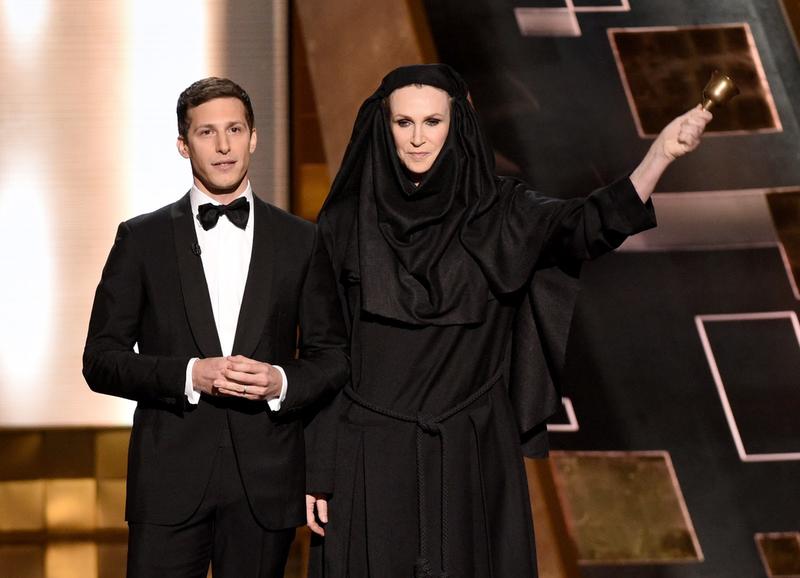
To help alleviate the financial burden of marathon-viewing Game of Thrones, Andy Samberg graciously took to the Emmys’ stage and gave out his HBO Now login. Most shockingly, the login — khaleesifan3@emmyhost.com and password1 — actually worked. The Brooklyn Nine-Nine star went on to say, “Check out Game of Thrones. Watch a buttload of Arliss. HBO doesn’t care; they said so on the record.” And that was 100% true as well. HBO tweeted out the login information shortly after Samberg’s stunt.
Lena Waithe Pens History | 2017
In 2017, Lena Waithe made history by becoming the first Black woman to win an Emmy for comedy writing. Waithe nabbed her award for co-writing the “Thanksgiving” episode of Netflix’s Master of None. The episode’s storyline was biographical for Waithe, who also plays the central character, Denise.
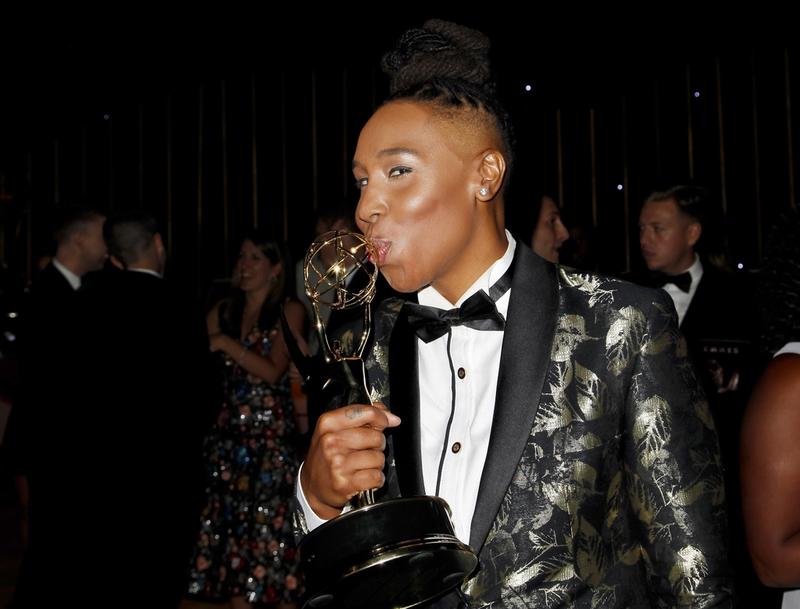
“Thanksgiving” traces several of the titular holiday dinners throughout Denise’s life as she comes to terms with being a lesbian — and comes out to her family. During her acceptance speech, Waithe said, “The things that make us different — those are our superpowers.” In 2018, she carried on that mantra, donning a rainbow cape reminiscent of the LGBTQ+ pride flag for the Met Gala red carpet. For Waithe and so many onlookers who see themselves in her, the win signified possibility. “There’s so many other funny women of color,” Waithe told Vogue. “I hope they will now have an opportunity because this door has been opened.”
Tatiana Maslany Receives One Award for 12 Roles | 2016
Orphan Black centers around Sarah Manning, a con artist played by Tatiana Maslany, who witnesses her doppelganger, Beth Childs (also played by Maslany), leap in front of a train. Hoping to make some quick cash, Sarah steals the woman’s identity. Her misadventures cause her to cross paths with soccer mom Alison Hendrix (Maslany), PhD student Cosima Niehaus (Maslany), assassin Helena (Maslany) and villainous Rachel Duncan (Maslany) — among others (Maslany).
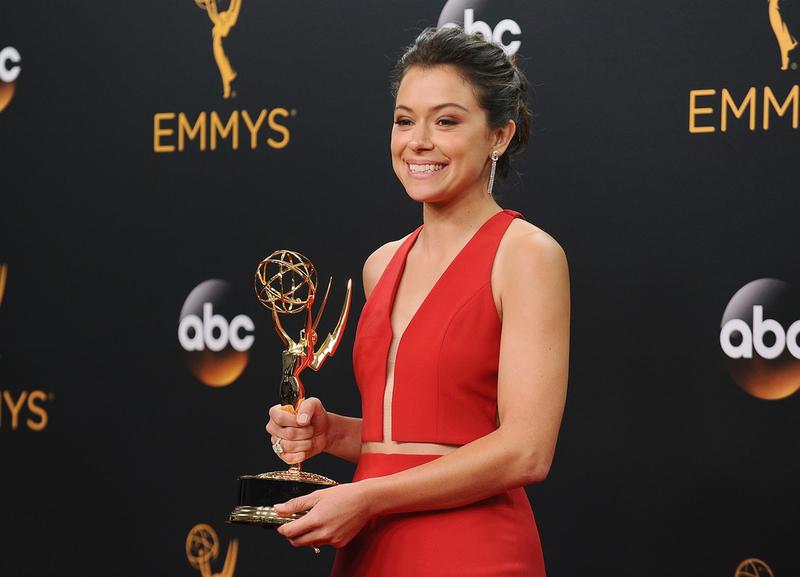
Get the picture? Maslany plays about a dozen clones, each with their own quirks, mannerisms and ways of speaking. Often, she shares the screen only with herself. Sometimes, she shares it with several selves or plays a clone who is impersonating another clone. It’s a wild ride. Maslany was praised by fans and critics alike but didn’t receive an Emmy nomination until 2015. Although she didn’t win on her first outing, she did beat out powerhouses Robin Wright and Viola Davis in 2016. The actress was so caught off guard that she scrambled to pull up a list of people she wanted to thank on her iPhone.
Helen Mirren Speaks Uncensored | 2006
Dame Helen Mirren is no stranger to royalty or the trappings of polite society. She is one of only a few performers to achieve the “Triple Crown of Acting.” Mirren won an Academy Award for Best Actress for her performance as Queen Elizabeth II in The Queen (2006). And then she won a Tony Award for Best Actress for playing Queen Elizabeth II again, this time in The Audience. And this Emmy? Mirren nabbed it for playing the titular role in the mini-series Elizabeth I (2005).
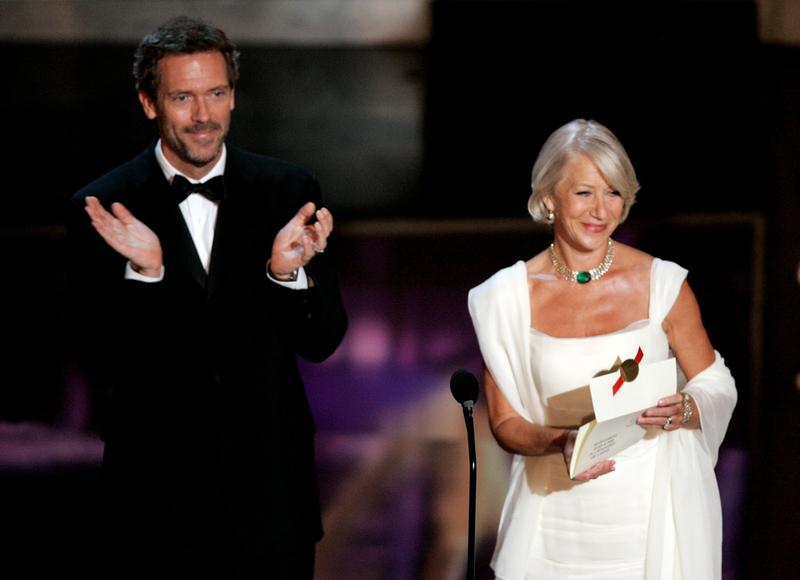
But despite her ability to convincingly portray diplomatic members of the royal family, Mirren is no stranger to speaking freely. At the Emmys in 2006, her name was called for Outstanding Lead Actress in a Limited Series or Movie, and she headed for the stage. The three-time Emmy winner climbed the steps carefully, minding the train on her dress. Holding the statuette, she famously remarked, “My great triumph is not falling a– over t-t as I came up those stairs. If you saw the shoes I’ve got on, you’d understand.” Best of all, Mirren’s debatably not-safe-for-broadcast-TV language was so unexpected that no one had time to bleep it out. Long live the queen.
Viola Davis in “How to Get Away With Making Emmy History” | 2015
In 2015, the Outstanding Lead Actress in a Drama Series category seemed more like a dream cast for an Ocean’s 8 (2018) sequel. With Claire Danes (Homeland), Viola Davis (How to Get Away With Murder), Taraji P. Henson (Empire), Tatiana Maslany (Orphan Black), Elizabeth Moss (Mad Men) and Robin Wright (House of Cards) all nominated, it was difficult to predict the outcome. Davis, in her first Emmy nomination, clinched the top prize.
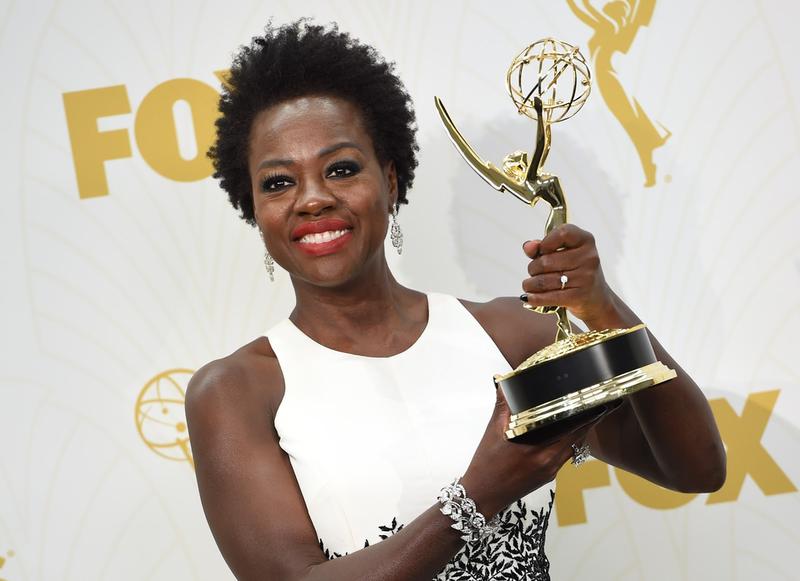
That night, Davis became the first Black woman to win an Emmy for Outstanding Lead Actress in a Drama Series. After accepting the award, she stood center stage, held her statuette and gave one of the most powerful speeches in awards-show history. “In my mind, I see a line,” Davis said, “and over that line, I see green fields and lovely flowers and beautiful white women with their arms stretched out to me over that line. But I can’t seem to get there no how. I can’t seem to get over that line.”
After quoting abolitionist and political activist Harriet Tubman, Davis added, “The only thing that separates women of color from anyone else is opportunity. You cannot win an Emmy for roles that are simply not there.” See her full speech here.
Ellen’s “The Puppy Episode” Fetches a Win | 1997
Both Ellen DeGeneres and her onscreen self, Ellen Morgan, made television history with “The Puppy Episode.” The episode was given this code name to keep the plot under wraps: In the fourth season of the sitcom Ellen, DeGeneres wanted her character to come out as a lesbian. ABC balked a bit, rumors about DeGeneres and her character’s sexuality swirled and advertisers and religious groups threatened the comedian.
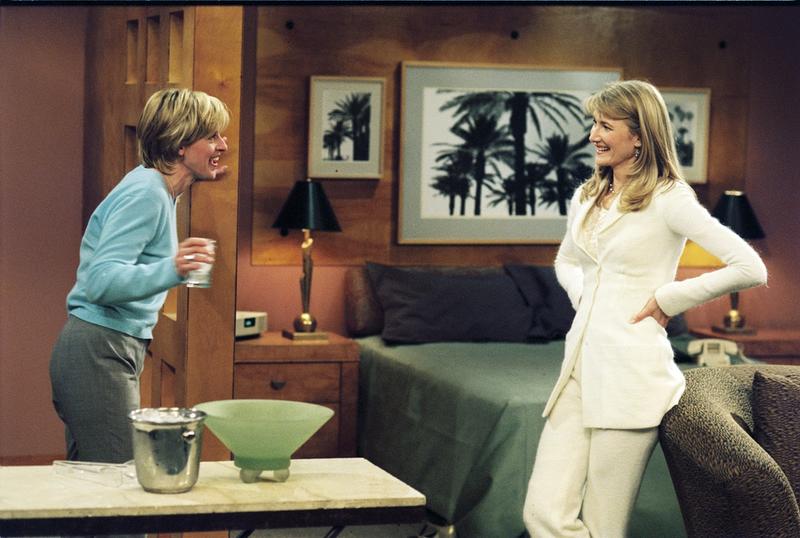
But “The Puppy Episode” went on to earn incredible ratings and earned DeGeneres an Emmy for writing. Guest stars on the show ranged from Melissa Etheridge and k.d. lang to Oprah. Most notably, Laura Dern played opposite DeGeneres as Susan, Morgan’s love interest, to whom DeGeneres (and her character) first speaks the words, “Susan… I’m gay.” However, even though this landmark episode became a cultural phenomenon, the show was ultimately canceled for being “too gay.”
Although she’s currently under fire for cultivating a toxic workplace, DeGeneres does have a whopping 32 Emmys to her name, with the majority being Daytime Emmys.
Gail Fisher Uncovers Emmys Gold in Mannix | 1970
Gail Fisher made history by winning an Emmy for her portrayal of Peggy Fair on Mannix, a show about a private investigator. Fisher’s 1970 win for Outstanding Performance by an Actress in a Supporting Role (Drama) marked the first time a Black woman won an Emmy. Her character, Peggy Fair, also made history by being one of the first Black women to be featured regularly in a primetime television show, along with Nichelle Nichols’ Uhura from Star Trek.
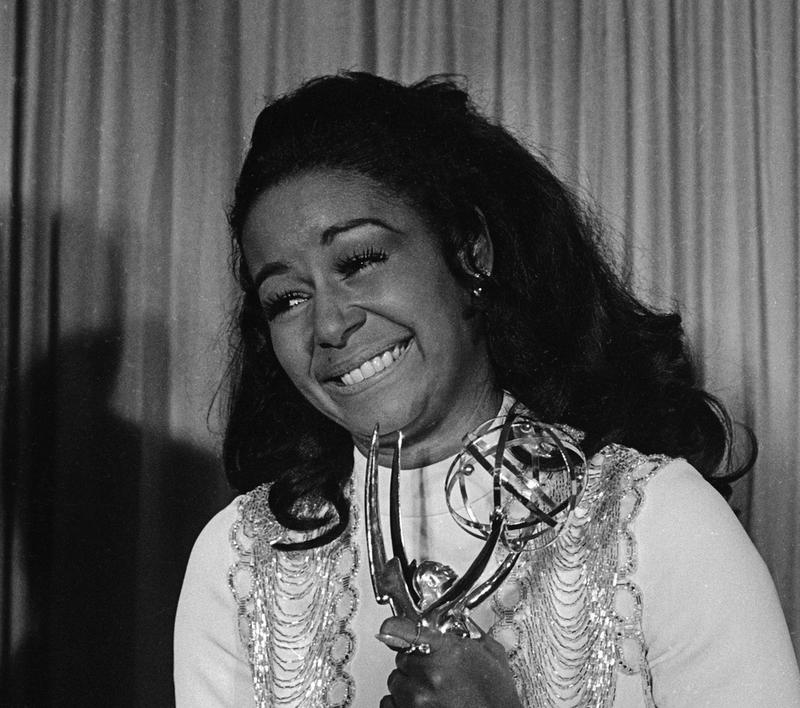
In an interview a few years after her Emmy win, Fisher said, “Well, certain people who had no knowledge of Black [people] have maybe — maybe — learned something because of Mannix‘s Peggy Fair… I’m proud I’m a part of that.” Fisher went on to win two Golden Globes for her portrayal of Peggy Fair and nabbed a role as a recurring character on the hit soap General Hospital.
Katherine Heigl Has a Moment of (Seattle) Grace | 2008
The Grey’s Anatomy writers were shocked (and offended) in 2008 when Katherine Heigl, one of the show’s stars, decided to withdraw from Emmy consideration. Heigl withdrew because she felt she wasn’t given material good enough to warrant a nomination. At the time, Grey’s garnered the highest rates for commercials — after American Idol — and was heavily viewed, but Heigl didn’t think her character’s story was particularly praise-worthy.
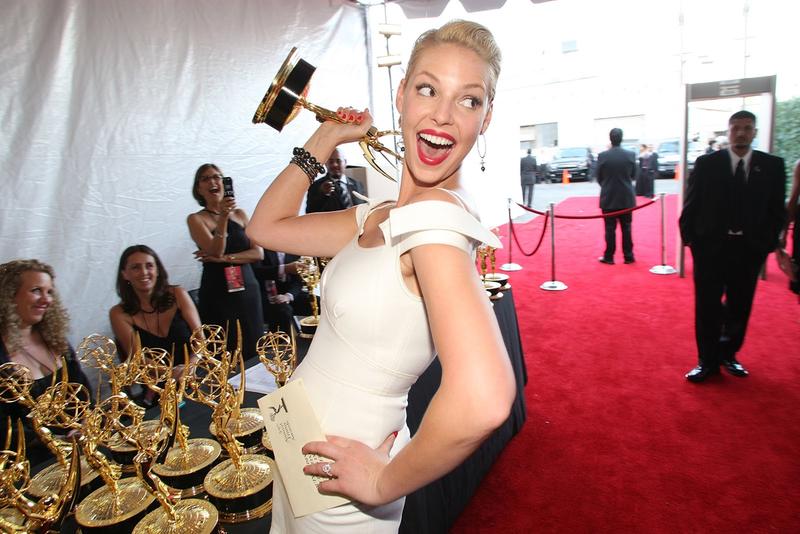
“In an effort to maintain the integrity of the academy organization, I withdrew my name from contention,” Heigl remarked. “In addition, I did not want to potentially take away an opportunity from an actress who was given such materials.” This commentary came on the heels of Heigl’s turn in blockbuster films 27 Dresses (2008) and Knocked Up (2007), so her withdrawal led to speculation that she wanted to wiggle out of her Grey’s contract. Of course, Heigl did leave the show eventually. Was this the beginning of the end? No comment.
“Metallics Are Very in This [Awards] Season”: Laverne Cox’s Historic Nomination | 2014
Orange Is the New Black changed the television landscape in so many ways. As Netflix’s second original series (right behind House of Cards), it helped ignite watercooler talk around the streaming service’s programming and transformed it from a virtual Blockbuster into a serious show and movie-making enterprise. It also helped center the stories of folks who often aren’t given space on primetime television, including women, people of color, transgender and gender non-conforming folks, and queer folks.
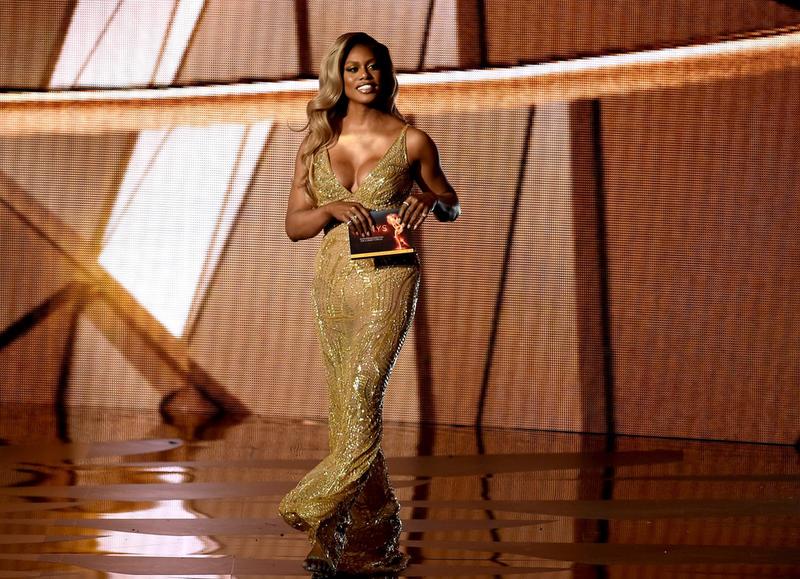
Not only did Orange provide performers with the opportunity to tell these stories, but it also gave the actors and actresses a platform outside of the show. This visibility only amplified around the 2015 awards season when Laverne Cox became the first-ever transgender person to win a Daytime Emmy for her role as an executive producer on T-Word. Cox helped pave the way for transgender actors, who have now starred in hugely successful shows such as FX’s Pose and HBO’s Euphoria. In 2019, Cox received her third Emmy nomination for Orange. In an interview with W, Cox suggested, “Now, for my third nomination, I’m like, maybe the Academy needs to vote for me, and we can make more history.”
Candice Bergen Has an “FYI” for Dan Quayle | 1992
In 1992, Murphy Brown had just aired its season four finale, which famously ends with the titular character, played by Candice Bergen, giving birth to a baby. What’s so contentious about that? Well, Brown was an unmarried woman who wanted to raise her child on her own terms. What’s so contentious about that? We’re not sure, but former Vice President Dan Quayle certainly had something to say about it at the time.
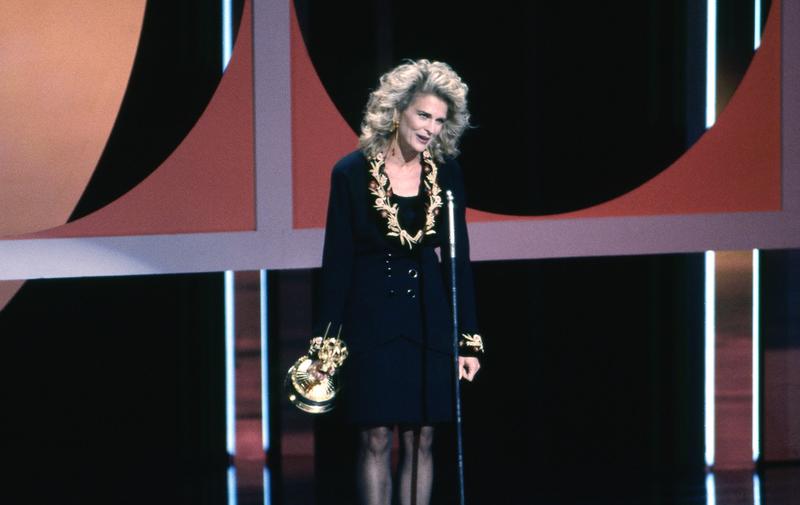
According to Quayle, Bergen’s character was “mocking the importance of fathers by bearing a child alone and calling it just another ‘lifestyle choice.'” Of course, one could also say that Quayle’s decision to voice his opinion was also a real choice. Bergen thought so too. While accepting her Best Actress award, she thanked the VP, the “cultural elite” and the show’s writers for “spelling words correctly” (a jab at another gaffe the VP had recently made). In season five of Murphy Brown, the writers worked Quayle’s remarks into the first episode so characters could fire back with some salty quips.
“King of Calypso” Harry Belafonte Courts an Emmy | 1960
Known as the “King of Calypso” for popularizing the Caribbean musical style in the 1950s, Harry Belafonte shot to fame with his recording of “The Banana Boat Song.” After achieving international success in the music industry, Belafonte broke into acting and won a Tony Award in 1954. Four years later, he became the first Black person to win an Emmy for his special Tonight With Harry Belafonte.
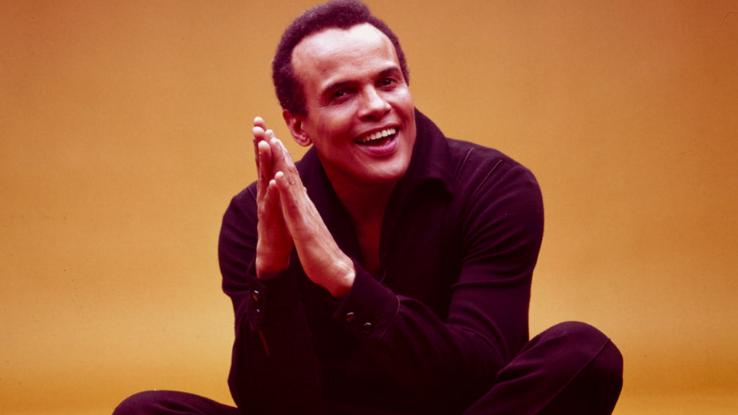
This landmark win came at a time when the Civil Rights Movement was prominent in the United States. Belafonte, who has remained an activist throughout his life, was an early supporter of the movement and became one of Martin Luther King Jr.’s confidants. He went on to portray many characters on stage and in television and film, with his most recent appearance being in Spike Lee’s BlacKkKlansman (2018).
Betty Thomas Gets “Punk’d” 18 Years Early | 1985
Perhaps one of the strangest moments on our list occurred when Betty Thomas attempted to accept her Best Supporting Actress in a Drama Emmy in 1985. The Hill Street Blues star headed for the stage when her name was called but was shocked to see party crasher Barry Bremen, known as “The Great Imposter,” accepting the award on her behalf.
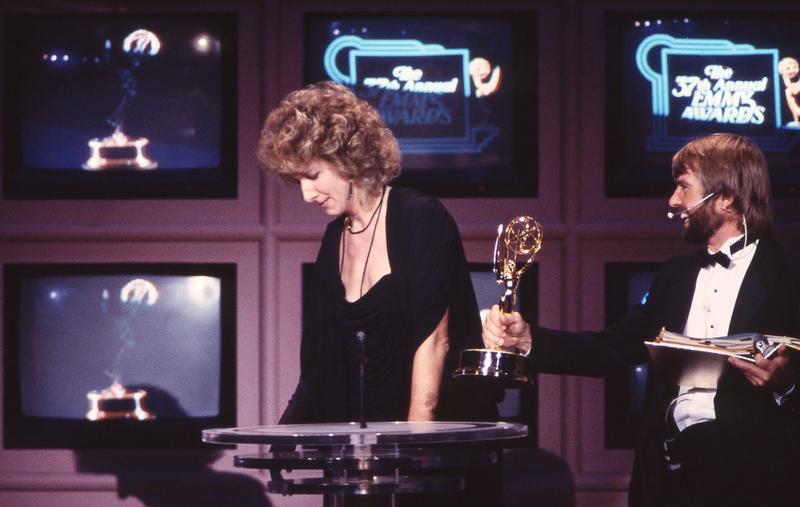
The presenter, Peter Graves, was equally stunned and handed over the award. Audience members thought it was a gag, and a few folks even laughed at Bremen’s impromptu speech. But even though audience members and the stage crew were skeptical — especially since Thomas was there — no one stopped Bremen. Afterward, he was arrested and fined for theft. (Talk about a case of the blues.) Fortunately, Thomas was able to give the speech she had prepared after a much-needed commercial break.
Thank You for Being a Win | 1988
The Golden Girls carved out a space for women in comedy in a new, innovative way. Not only was the cast composed of four leading ladies, but they were also older women. Bea Arthur, Rue McClanahan, Betty White and Estelle Getty proved that older women were funny, intelligent and completely capable of being stars — even though women over 40 were typically written off by Hollywood.
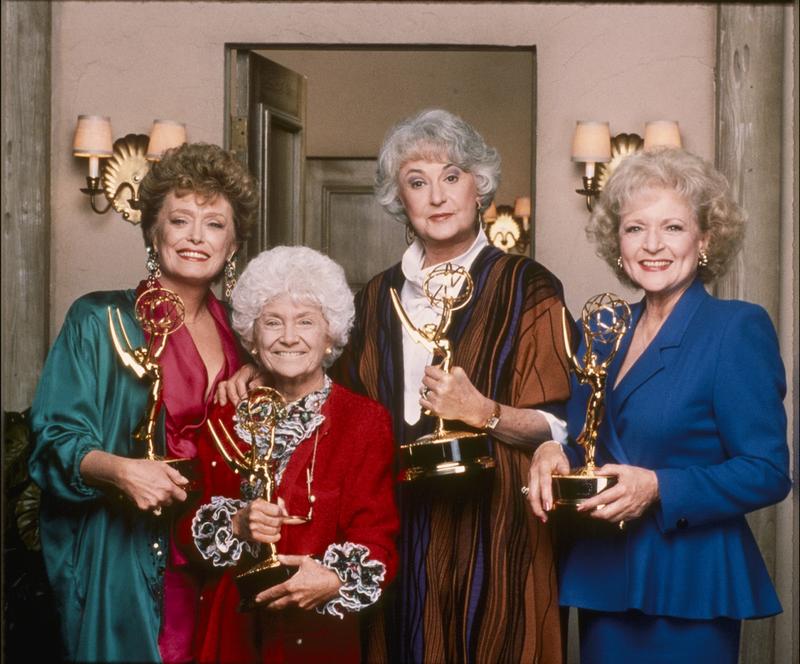
In 1986, White became the first Golden Girl to win a Lead Actress Emmy; the following year, McClanahan won the award. Finally, in 1988, both Getty and Arthur took home prizes of their own for Best Supporting Actress and Best Actress, respectively. This represented the second time in Emmys’ history that an entire cast had won acting awards — All in the Family accomplished this feat a decade earlier. But this win certainly made history in that each of the primary performers in an all-women cast was recognized.
Alan Alda Cartwheels to Success | 1979
Perhaps best known for his work as an actor on the acclaimed TV series M*A*S*H, Alan Alda is now a six-time Emmy winner. In fact, he had already won several Emmys for the show by the time 1979 rolled around, but this particular nomination at this particular awards show was something that really excited him.
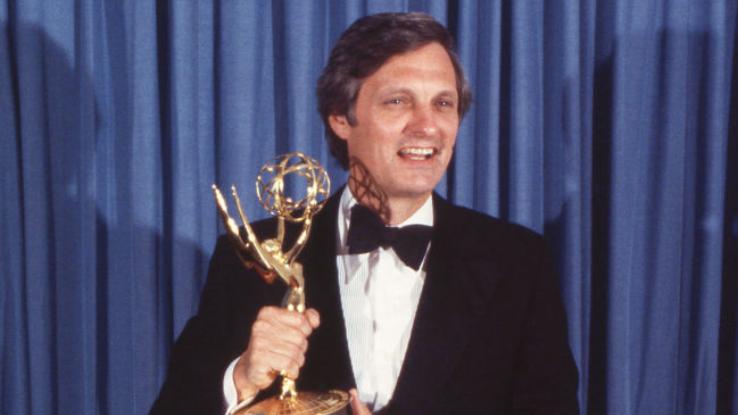
For as long as he could remember, Alda wanted to write for TV and movies, so when he won the Emmy for Outstanding Writing for an episode of M*A*S*H, he flipped out. No, he really flipped out. Cartwheeled, in fact. He stood, started toward the stage and then did an impromptu cartwheel before heading up to collect his award.
The Night Of Riz Ahmed’s Win | 2017
When he won Outstanding Lead Actor in a Limited Series or Movie for HBO’s The Night Of, Riz Ahmed became the first man of Asian descent to win an acting award at the Emmys. In the series, Ahmed plays Nasir “Naz” Khan, a Pakistani/Iranian-American student accused of murdering a young woman. The show examines the role racism plays within the criminal justice system.
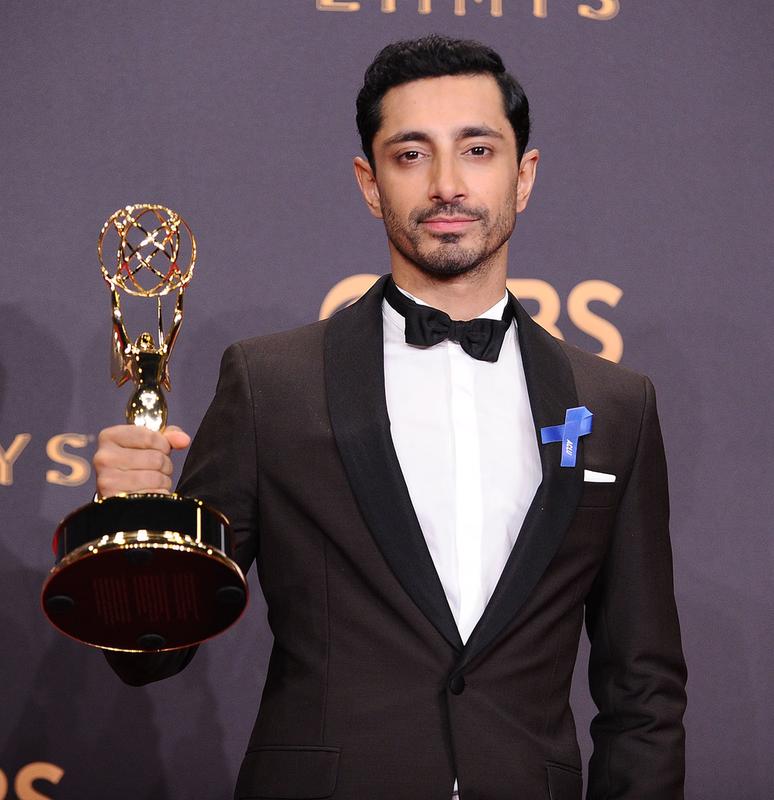
“I want to say it is always strange reaping the rewards of a story based on real world suffering,” Ahmed said in his acceptance speech. “But if this show has shown a light on some of the prejudice in our societies, xenophobia, some of the injustice in our justice system, then maybe that is something.” Last year, Sandra Oh was nominated for her portrayal of the titular character in Killing Eve, but she didn’t nab the Emmy. If Oh wins this year, she would become the second Asian person — and first Asian woman — to win an Emmy for acting.
Elaine May & Mike Nichols Trash TV | 1959
At the 11th Emmy Awards in 1959, things were…a bit strange. Richard Nixon, then vice president, was in attendance and spoke about the importance of free speech on television. And then, the renowned comedy duo of Elaine May and Mike Nichols went on stage to perform a skit in which they presented an award for Total Mediocrity.
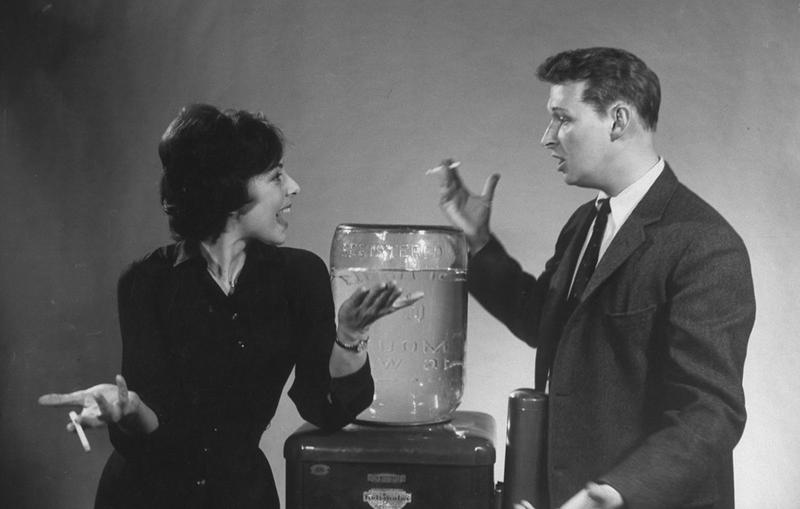
They were, of course, directly poking fun at the Emmys themselves as well as all the Hollywood pomp and circumstance. An oldie but a goodie, this kind of comedy was certainly something that paved the way for later shows like Saturday Night Live. Like most SNL morning-after recaps, perhaps it’s better seen than described.
Blessed Be The Handmaid’s Tale | 2017
Although Netflix made history when its original series House of Cards was nominated for an Emmy for best drama, it never actually won the top prize. In 2017, Hulu beat Netflix to the punch when the streaming service nabbed its first series Emmy with The Handmaid’s Tale. This win made Hulu the first streamer to ever win a major series award.
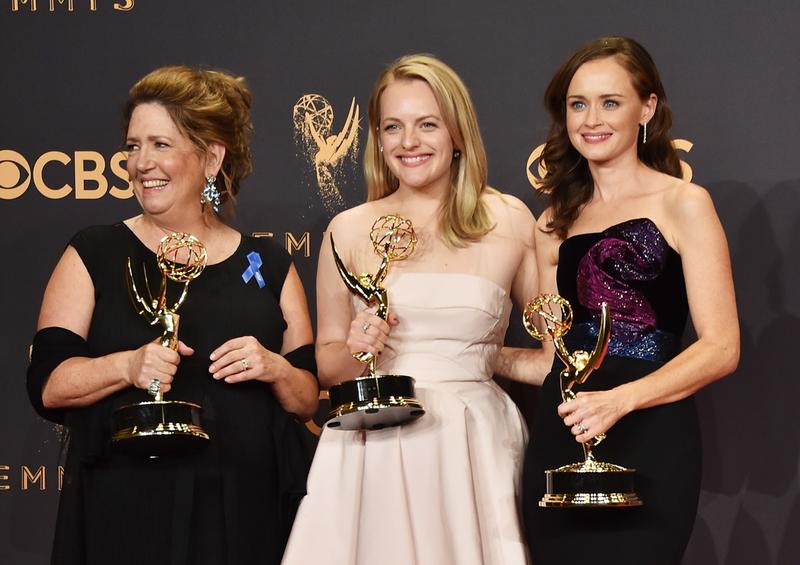
The following year, Amazon joined Hulu’s ranks with a comedy series win thanks to The Marvelous Mrs. Maisel. In 2018, Netflix was nominated an astounding 112 times for its programming — more than any other network. Despite this great showing, the service only walked away with 23 Emmys, tying with long-standing network HBO. It’s safe to say that Netflix may have been the first to change the game, but now it’s being outdone by the competition. May the award season open.
“Diversity Is Solved” Musical Number Doesn’t Sing Praises | 2018
The 70th Emmy Awards kicked off with a spectacular musical number about diversity. That’s right. Saturday Night Live cast members Kenan Thompson and Kate McKinnon took to the stage to quip about Hollywood making so much progress, implying (tongue in cheek, of course) that the whole issue of diversity in the industry had been “solved.”
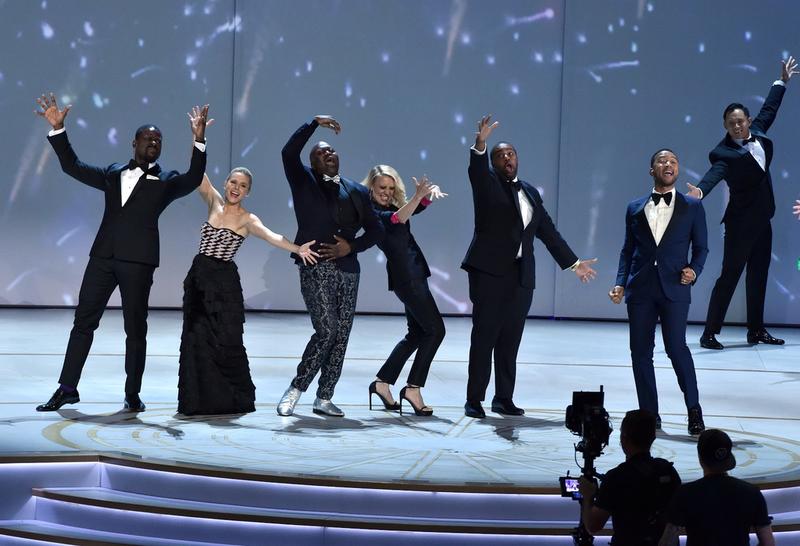
“We solved it/We got with the times/There’s room for all of our voices but mostly Shonda Rhimes,” the duo belted. They then gave a shout out to Sandra Oh, whose nomination for Killing Eve made her the first Asian actress nominated in the Lead Actress in a Drama category. “It’s an honor just to be Asian,” Oh famously remarked. Tituss Burgess, Kristen Bell, Sterling K. Brown and RuPaul — who delivered the news that, no, diversity had not been solved — all joined the number.
Cagney & Lacey & Karen Arthur | 1985
Karen Arthur made Emmys history in 1985 by becoming the first woman to win an award for directing. Arthur won for directing an episode of the hit drama Cagney & Lacey, which was sort of the OG Rizzoli & Isles. In the show, the titular women are cops in New York City, but, despite being partners on the job, they lead separate, rather different personal lives.
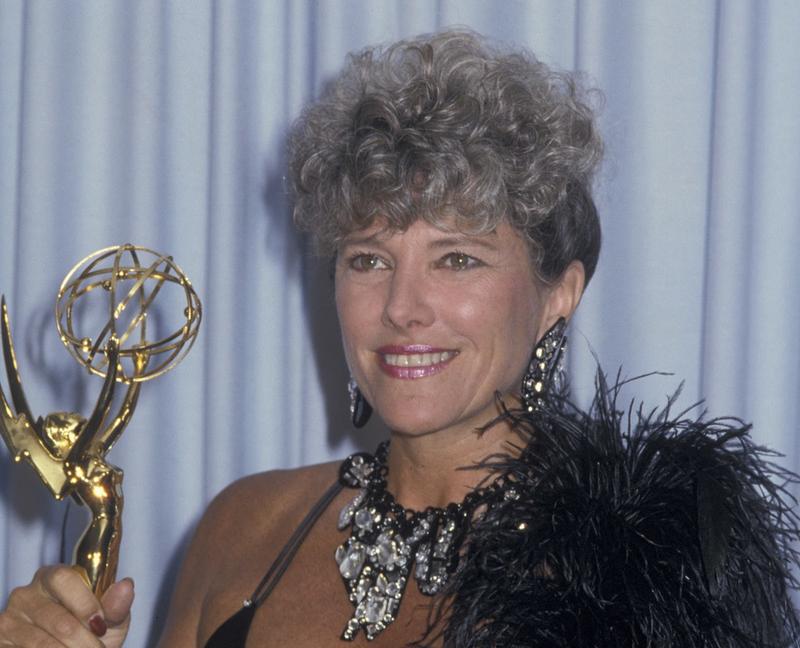
We can’t think of a better way for a woman to make Emmys’ history than with this feminist show from the 1980s. And although Arthur nabbed her award back in the mid-80s, not many have followed in her footsteps. Mimi Leder won for directing an episode of ER, and, in 2017, cinematographer-turned-director Reed Morano won for her work on the pilot for Hulu’s The Handmaid’s Tale.
Barbara Stanwyck Copes With Her Cape | 1961
Four-time Oscar nominee Barbara Stanwyck was known as the highest-paid woman in the United States in 1944. Over the course of 38 years, she made a whopping 85 films and then turned to the next big thing — television. Though she ended up winning three Emmys over the years, her first win for The Barbara Stanwyck Show in 1961 is certainly her most memorable.
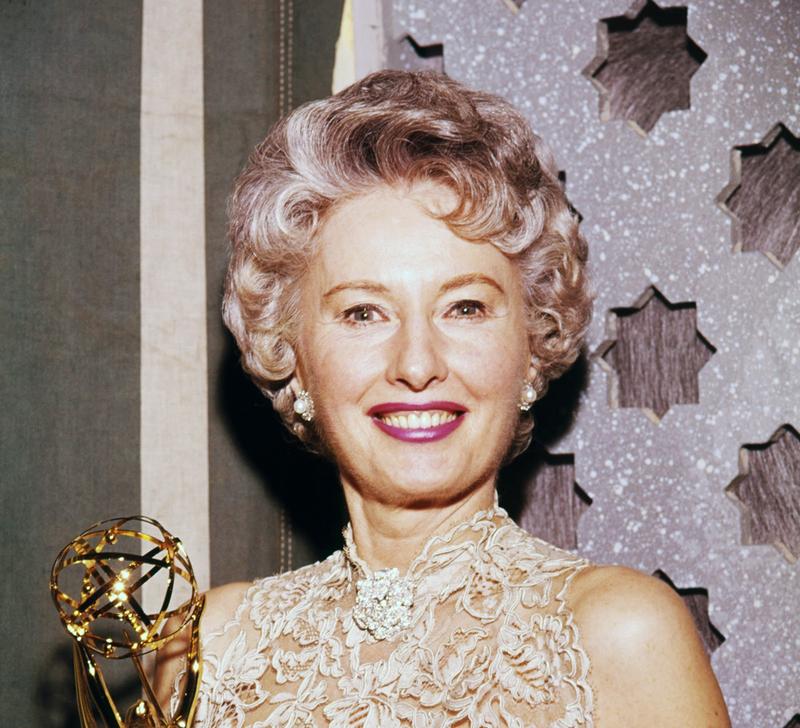
When Stanwyck stood to claim her award, the cape she was wearing got caught on the back of her dress. This original “wardrobe malfunction” was captured on camera — making it all the more embarrassing. While a few folks tried to free the iconic actress, several camera operators took full advantage of the chance to get a close-up of Stanwyck’s panicked face. Luckily, the cape was finally detached, and Stanwyck made it to the stage.
Isabel Sanford Leads the Way on The Jeffersons | 1981
In 2016, Tracee Ellis Ross, star of ABC’s Black-ish, earned her first Emmy nomination, making her the first Black actress to be nominated for Lead Actress in a Comedy Series in 30 years. For the entirety of Emmys’ history, only five Black women have ever been nominated in this category, and of these five actresses, only one comedy star nabbed the award.
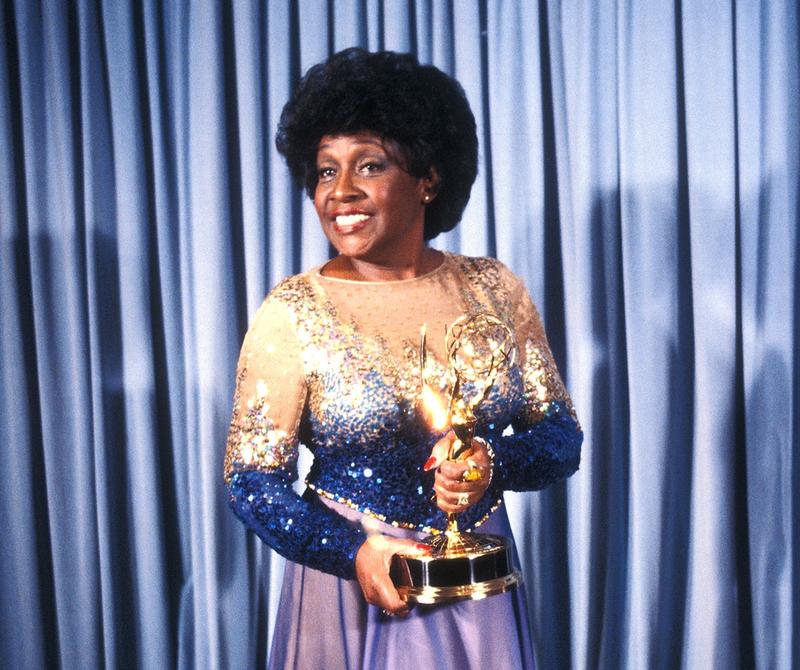
In 1981, Isabel Sanford won an Emmy for Outstanding Lead Actress in a Comedy Series for her portrayal of Louise “Weezy” Jefferson, a character she first played on All in the Family prior to the show’s spinoff, The Jeffersons. Over The Jeffersons‘ 11 seasons, Sanford was nominated an impressive seven times, although 1981 marks her only win. When making her acceptance speech, Sanford started off by saying, “At last,” to thunderous applause. Ever the comedian, she then apologized for chewing a piece of cheese she’d put in her mouth before the winner was announced.
Earl Warren Broadcasts His Feelings on TV | 1951
The 1951 Emmys were notoriously not great. For the first few years of the show’s run, only Los Angeles-based TV shows and stations were nominated for Emmys. (So L.A., if you ask us.) Strangely, it was also the year a now-defunct category called Best Sports Program was introduced. The nominees? The L.A. Rams and then just vague things like College Basketball Games and Hollywood Baseball. But the strangest thing was Governor Earl Warren’s speech.
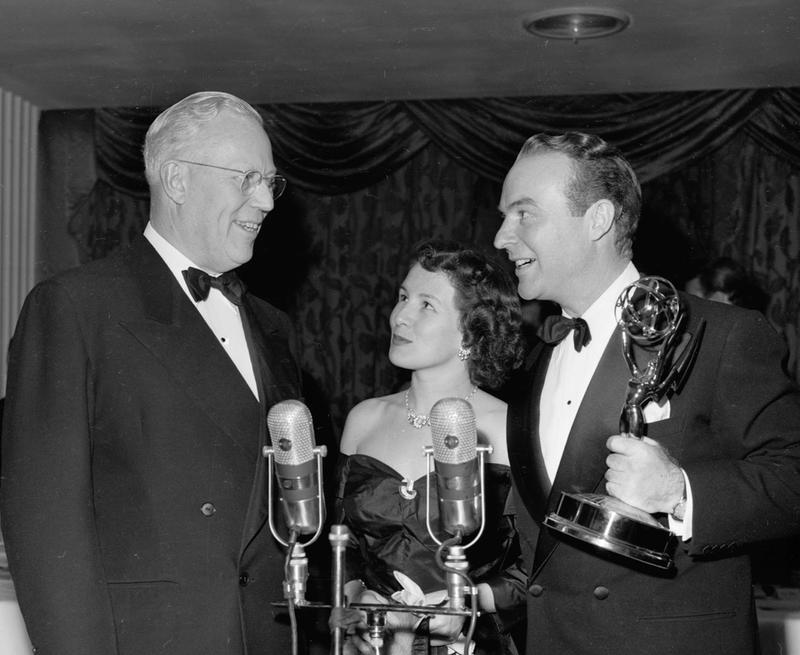
The Emmys have gone host-less a few times, but in ’51, they pulled out all the stops and…asked Governor Warren to host? This strange choice only got stranger when the governor-turned-host compared television to the Bible. “Just like one book — the Bible — affected more lives than all the gunpowder ever invented,” he uttered, “so it will be with television.” (Really gives new meaning to the term “televangelist,” doesn’t it?)
Direct Your Attention to Donald Glover | 2017
In 2017, Donald Glover won an Emmy for Lead Actor in a Comedy Series for his wonderful performance in Atlanta, but his first Emmy win came earlier in the evening when he nabbed the award for Outstanding Directing in a Comedy Series for an episode of Atlanta. Glover made history with this initial win by becoming the first Black director to win in the comedy category.
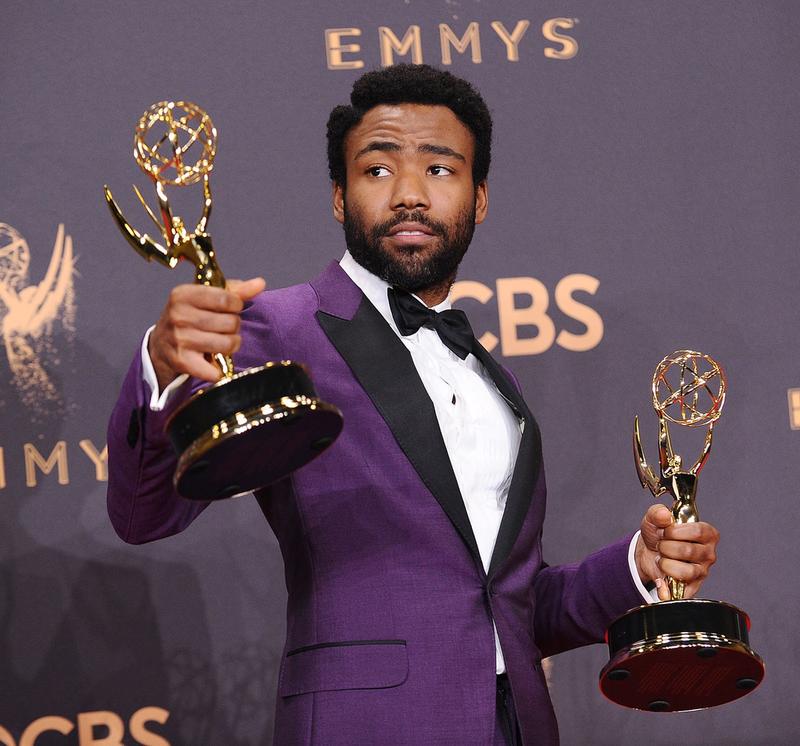
On stage, Glover thanked “the great algorithm” that landed all the producers, writers, cast and crew of Atlanta in the same place. After shouting out his family members in the audience, he thanked Hiro Murai, a filmmaker (and Atlanta director/producer) who taught Glover about the art of directing. “I love you and thank you for being my best friend and making this with me,” Glover said. Murai would go on to work on several other projects helmed by Glover, including the Grammy-winning music video for Childish Gambino’s “This Is America” and the Amazon feature Guava Island.
“You’re a Winner, Baby!”: Drag Race Tops the Competition | 2018
Though RuPaul won an Emmy in 2016 for Outstanding Host in a Reality or Competition Program, Drag Race didn’t take home the big prize for best program until 2018. That same year, RuPaul won again for hosting and lent his talents to the sarcastic “Diversity Is Solved” opening number.
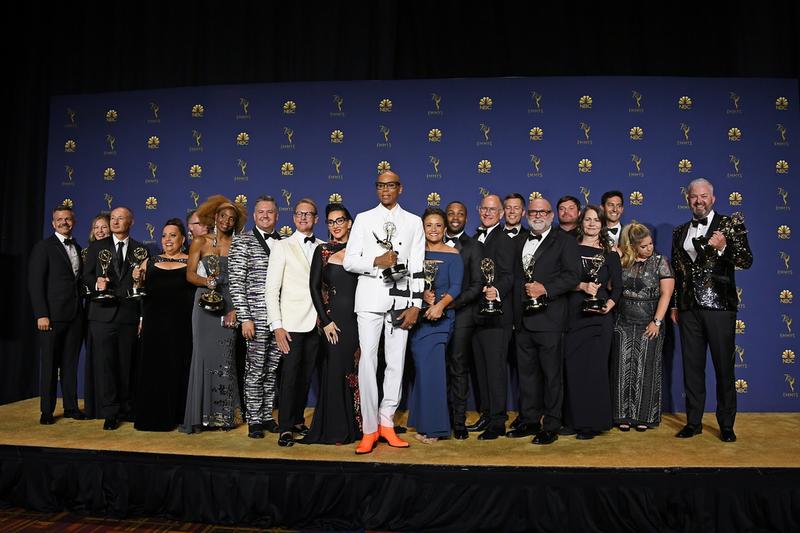
The win for Drag Race reiterates the huge way drag and other elements of queer culture are finding a place in mainstream media. “I feel like our show adds a little relief for the outsider,” RuPaul said backstage. “We celebrate people who dance outside the box… Those stories need to be told.” The winning host also mentioned that all outsiders can find refuge in the show by seeing other stories valued and represented outside the standard (and homogeneous) Hollywood fare.
Me Too Moments Before the Movement | Numerous Years
Before the Me Too movement gained steam in Hollywood, “jokes” that objectified women or ended in sexual harassment were commonplace on the Emmys stage. Back in 1951, Groucho Marx went on stage to accept an award, but instead of taking the statuette, he grabbed presenter (and former Miss America) Rosemary LaPlanche. Later he “joked” that he thought she was the Emmy.
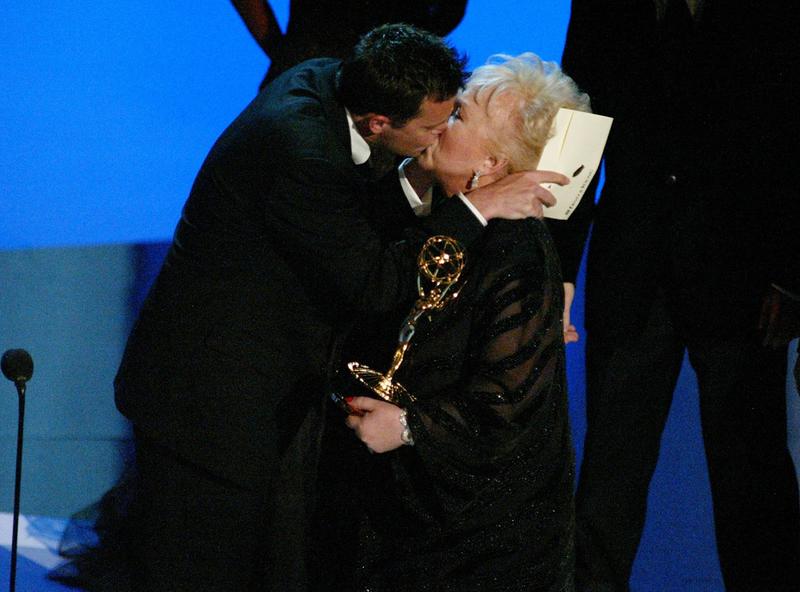
In 2008, a new category for reality show personalities was added. On stage, Heidi Klum joined fellow celebs Tom Bergeron and Howie Mandel wearing a suit that matched those of the men. They then proceeded to perform a skit that involved stripping off Klum’s suit until she was in a more revealing “feminine” outfit. And who can forget the unsolicited kisses Matthew Perry and Bryan Cranston planted on Doris Roberts (Everyone Loves Raymond) and Julia Louis-Dreyfus, respectively, as the women accepted their Emmys.
Virtual Insanity | 2020
Red carpets, superstars dressed to the nines, and an army of paparazzi are par for the course at the Emmy Awards Show. At least, that’s typically the case. However, “typical” is the last word anyone ought to use to describe 2020. In the wake of the COVID-19 pandemic, in-person engagements had to migrate online. People worked from home, schooled from home, and participated in the Emmys from home.
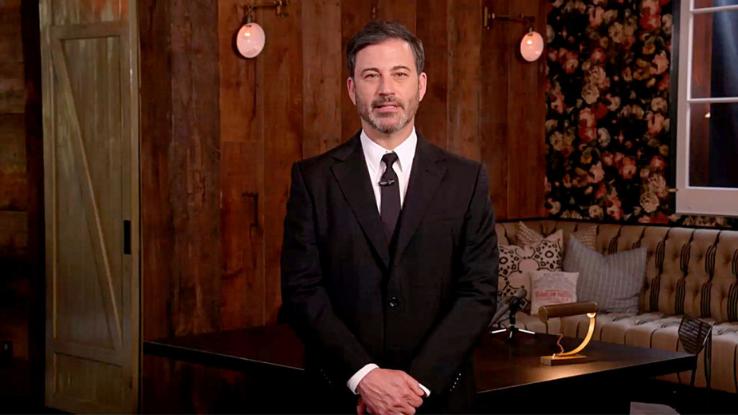
Jimmy Kimmel hosted this surreal ceremony. He, a platoon of dedicated crew members, and a handful of guests were the only occupants of the Staples Center. The myriad actors and actresses that would’ve attended were replaced with cardboard cutouts (yeah, really) and Zoom screens. 2020 may go on record as the “loneliest Emmy Awards Ceremony” in history.






